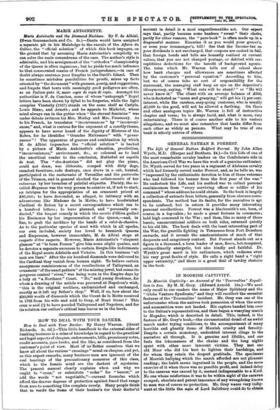HOW TO DEAL WITH YOUR BANKER.
How to Deal with Your Banker. By Henry Warren. (Grant Richards. 3s. 6d.)—This little handbook to the external sides of banking business is a mine of knowledge in regard to the practical and legal aspects of cheques, endorsements, bills, promissory notes, credit accounts, pass-books, and the like, as considered from the customer's point of view. Most of us flatter ourselves that we know all about the various " crossings " usual on cheques, and yet, as this expert remarks, many business men are ignorant of the real bearings of the precautionary measures of this class, which to the female mind are the darkest of mysteries. The present manual clearly explains when and why we ought to "cross," or substitute "order" for "bearer," or add the words "not negotiable,"—current formulas which afford the drawer degrees of protection against fraud that range from zero to something like complete surety. Many people think that to verify the items of their banker's (or their doctor's)
account in detail is a most nngentlemanlike act. Our expert says that, partly because some bankers " sweat " their clerks, partly for other reasons, the " pass-book " is often made up in a disgraceful manner. Examine it as you would your grocer's, or even your ironmonger's, bill ! See that the Income-tax OQ your dividends is not surcharged, that coupons are cashed in full, that foreign bonds and bills are honestly realised at current values, that you are not charged postage, or debited with sur- reptitious deductions for the benefit of background agents. The tales which Mr. Warren tells out of school show how bank charges and allowances are sometimes affected by the customer's "personal equation." According to him, but we of course take no sort of responsibility for the statement, the managing staff keep an eye on the depositor's idiosyncrasy, saying, "What rate will he stand ? " or "He will never know it." The client with an average balance of £300, who is docketed as "mean and grasping," will get his 11 per cent. interest, while the careless, easy-going customer, who is usually £5,000 to the good, will not be allowed a farthing. On these and other analogous topics Mr. Warren is full of instructive chapter and verse; be is always lucid, and, what is more, very entertaining. There is of course another side to his various allegations, and we must also remember that banks differ from each other as widely as persons. What may be true of one bank is utterly untrue of others.


















































 Previous page
Previous page